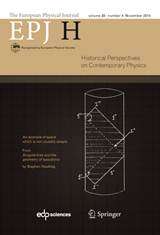Penrose's and Hawking's early math award revisited

In 1966, it was Roger Penrose who won the prestigious Adams Prize for his essay "An analysis of the structure of space-time." The Adams Prize – named after the British mathematician John Couch Adams – is awarded each year by the Faculty of Mathematics at the University of Cambridge to a young, UK-based mathematician. At the same time, Steven Hawking won an auxiliary to the Adams Prize for an essay entitled Singularities and the Geometry of Spacetime, shortly after completing his PhD. A copy of the original Hawking submission has now been reproduced in EPJ H.
That year, the topic of the Adams Prize was geometric problems of relativity, with special reference to the foundation of special relativity and cosmology. The historical context in which such papers were written is described by George Ellis, a professor emeritus in mathematics from the University of Cape Town, South Africa, who was a close friend and colleague of Stephen Hawking in the 1960s. In a paper published in EPJ H, Ellis explains that the issue of the existence of spacetime singularities was then a vexing one. Indeed, such cosmological singularities meant an end to predictable physics and the existence of a start of the universe at the start of things ('the big bang'), and of an end to physics at the endpoint of gravitational collapse after the coming into being of black holes.
Hawking's prize-winning essay generalises to the cosmological case a global approach to showing the existence of singularities at the end point of gravitational collapse previously developed by Penrose in the case of black holes. This work is important because it is a clear statement that, in the classical cosmological context, spacetime singularities do indeed exist.
These findings implicate that one cannot avoid the introduction of quantum gravity studies of the start of the universe. However, Ellis points out, "The issue of whether a spacetime singularity occurs in the real universe remains open. We do not in fact know if the universe had a beginning or not."
More information: Ellis, G.F.R. (2014). Stephen Hawking's 1966 Adams Prize Essay. European Physical Journal H. DOI: 10.1140/epjh/e2014-50014-x
Hawking, S. (2014). Singularities and the Geometry of Spacetime. European Physical Journal H. DOI: 10.1140/epjh/e2014-50013-6
Journal information: European Physical Journal
Provided by Springer

















